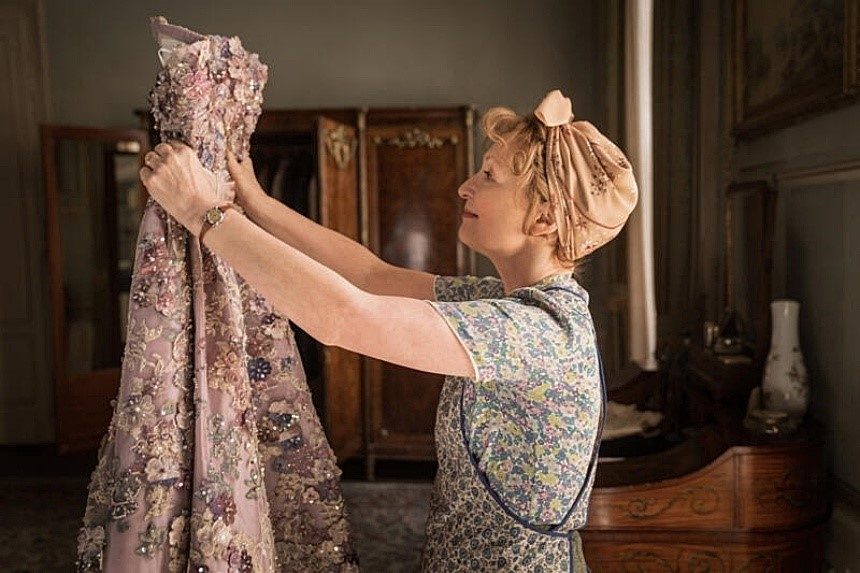Mrs. Harris Goes to Paris
⭐️ ⭐️ ⭐️⭐️
Rating: PG
Run Time: 1 hour 55 minutes
Stars: Lesley Manville, Isabelle Huppert, Lambert Wilson, Jason Isaacs, Ellen Thomas
Writers: Anthony Fabian, Carroll Cartwright, Keith Thompson, Paul Gallico (Novel)
Director: Anthony Fabian
It’s perhaps too early to tell, but I’m hoping we’re at the beginning of a new trend in movies: Stories of kind people helping each other, wishing only the best for strangers, and jointly overcoming impossible odds to make someone’s dream come true.
Let’s call it the Cinema of Solace.
Mrs. Harris Goes to Paris — a sweetly cheeky tale based on a novel by Paul Gallico — is a story of people with hidden hearts, and the woman who inspires them to bring those hearts into the sunlight.
A hard-working London housecleaner, Mrs. Harris (twinkly eyed Lesley Manville) has one burning ambition, and it’s a doozy: She wants, above all else, to own a gown by Christian Dior.
But this is 1953, long before you could waltz down to Harrods and pluck a Dior off the rack. No, in post-war Paris each dress is made to order by skilled craftspeople under the direct gaze of the legendary designer. Even though she has scrimped and saved the necessary 500 quid to buy an entry level Dior, Mrs. Harris’s ambition is, sadly, a pipe dream — until an unlikely parade of people, friends and strangers alike, step outside their assigned roles to lend assistance.
There’s the aristocratic Marquis de Chassagne, played by Lambert Wilson, who ushers Mrs. Harris into a Dior fashion show simply because she seems nice. (If you have not seen Wilson’s star turn in the 2020 French biographical drama De Gaulle, do yourself a favor and find it.) There’s Archie, the gruffly sentimental dog track betting window cashier (Star Trek: Discovery’s Jason Isaacs) who secretly protects Mrs. Harris from a burst of irresponsible enthusiasm. There’s a collection of homeless guys in a Paris train station who find her a place to sleep her first night. And there’s her best friend and fellow housecleaner Vi (Ellen Thomas), a West African dynamo who offers support when even the ever-hopeful Mrs. Harris begins to feel defeated.
There is not a villain to be found in Mrs. Harris Goes to Paris, not even the officious Dior office manager (stern-but-soft Isabelle Huppert) who initially sees Mrs. Harris as an unwanted distraction from the company’s highfalutin’ aspirations but soon becomes her great champion.
As Gallico observes in his novel, “They were worlds apart in everything but the simplicity of their humanity, and so they were really not apart at all.”
This almost subversive appeal to undisciplined kindness and shared human-ness is something we’re seeing with gratifying frequency in movies these days: The unapologetically generous couple in Jerry and Marge Go Large; the good-natured would-be pro golfer in Phantom of the Open; the lonely handyman who builds a companion robot in Brian and Charles; the undocumented couple who refuse to compromise their ideals while parenting three future NBA stars in Rise.
Most importantly, neither Mrs. Harris nor any of those other films carry with them a whiff of condescension. While celebrating the human capacity for kindness, each one takes pains to acknowledge selflessness often comes with a price — one that is ultimately, and always, worth it.
Gallico wrote a whole batch of Mrs. Harris novels: In subsequent adventures she goes to New York, to Moscow, and to Parliament. At the latter, alas, she does finally run into some incurably nasty souls who prove to be unmoved by the charms of this kind and hopeful new Member of Parliament. Even in 1965, Gallico was keenly aware that institutional cynicism leaves a permanent stain.
With her crinkly smile and wistful gaze, Manville is among the screen’s most appealing actors. As Mrs. Harris — a stalwart optimist who has kept the homefires burning for her MIA husband for nearly a decade after his RAF plane disappeared over Europe — Manville sounds echoes of her crowning performance, as the tragically lonely yet perpetually chipper Mary in Mike Leigh’s Another Year (2010).
Like Mary, Mrs. Harris voices relentless assurance that, despite appearances, all will be well. Unlike Mary, Mrs. Harris really believes that.
And as Mrs. Harris Goes to Paris reassures us from start to finish, that kind of happy optimism can be contagious.
Featured image: Lesley Manville in Mrs. Harris Goes to Paris (Focus Features)
Become a Saturday Evening Post member and enjoy unlimited access. Subscribe now



